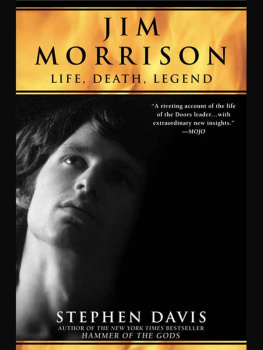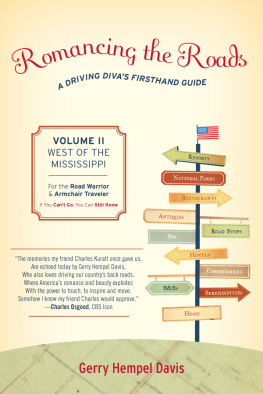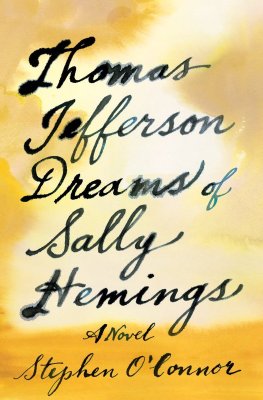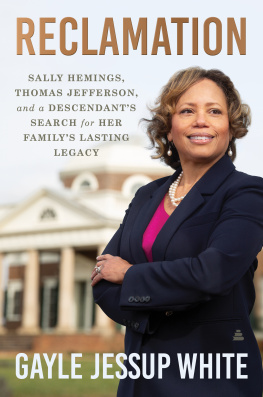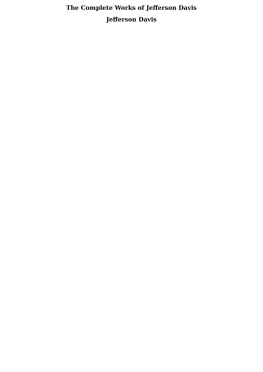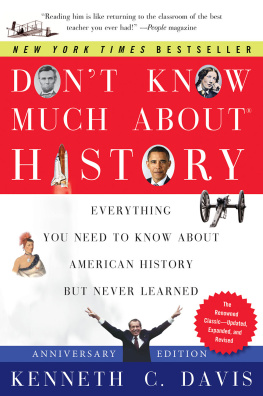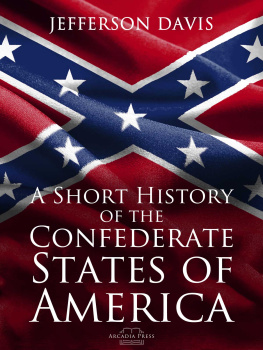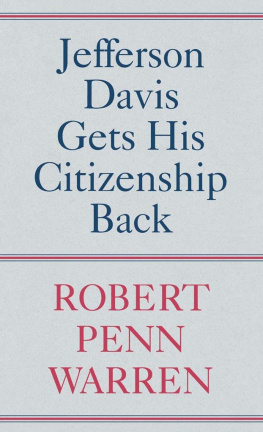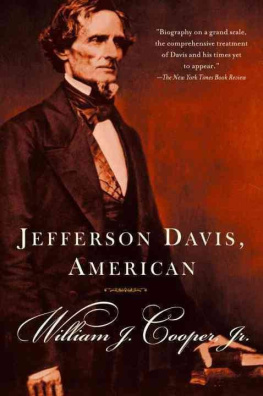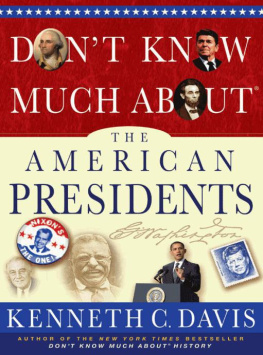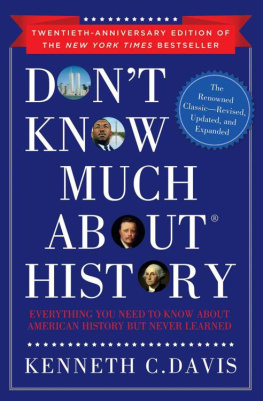Davis - Dont Know Much About History
Here you can read online Davis - Dont Know Much About History full text of the book (entire story) in english for free. Download pdf and epub, get meaning, cover and reviews about this ebook. year: 2009, publisher: HarperCollins, genre: History. Description of the work, (preface) as well as reviews are available. Best literature library LitArk.com created for fans of good reading and offers a wide selection of genres:
Romance novel
Science fiction
Adventure
Detective
Science
History
Home and family
Prose
Art
Politics
Computer
Non-fiction
Religion
Business
Children
Humor
Choose a favorite category and find really read worthwhile books. Enjoy immersion in the world of imagination, feel the emotions of the characters or learn something new for yourself, make an fascinating discovery.

Dont Know Much About History: summary, description and annotation
We offer to read an annotation, description, summary or preface (depends on what the author of the book "Dont Know Much About History" wrote himself). If you haven't found the necessary information about the book — write in the comments, we will try to find it.
Dont Know Much About History — read online for free the complete book (whole text) full work
Below is the text of the book, divided by pages. System saving the place of the last page read, allows you to conveniently read the book "Dont Know Much About History" online for free, without having to search again every time where you left off. Put a bookmark, and you can go to the page where you finished reading at any time.
Font size:
Interval:
Bookmark:

To my children, Jenny and Colin
Contents
Growth of a Nation:
From the Creation of the Constitution to Manifest Destiny
When Monopoly Wasnt a Game:
The Growing Empire from Wild West to World War I
Boom to Bust to Big Boom:
From the Jazz Age and the Great Depression to Hiroshima
W hen Dont Know Much About History first appeared in 1990, it was simply meant to serve as a fresh new take on American history. Busting myths with a dose of humor and real stories about real people, the book was conceived as an antidote to the dull, dreary textbooks we suffered through in high school or college. Nobody was more surprised than I was when the book spent 35 weeks on the New York Times Best-seller list and became an antitextbook that has sold 1.3 million copies. If nothing else, this little book proved that Americans dont hate historythey just hate the dull version they got when they were growing up.
With the same question-and-answer style, this updated, revised, and greatly expanded edition brings history right up to Bill Clintons impeachment and the bizarre 2000 election. Incorporating new discoveries, revelations, and theories about Americas past, this revised edition elaborates on such long-standing American controversies as the Jefferson-Hemings affair, the Hiss and Rosenberg cases, and the Iran-Contra adventure. There are also many new questions, many of them resulting from readers questions to me over the years.
For history buffs and history-phobes, longtime fans and a new generation still in the dark about Americas past, this book provides Everything You Need to Know About American History. And more!
Kenneth C. Davis
AUGUST 2002
B ack in the early 1960s, when I was growing up, there was a silly pop song called What Did Washington Say When He Crossed the Delaware? Sung to the tarantella beat of an Italian wedding song, the answer went something like Martha, Martha, therell be no pizza tonight.
Of course, these lyrics were absurd; everybody knew Washington ate only cherry pie.
On that December night in 1776, George might have told himself that this raid on an enemy camp in Trenton, New Jersey, better work. Or else he might be ordering a last meal before the British strung him up. But as the general rallied his ragged, barefoot troops across the icy Delaware, one of his actual comments was far more amusing than those fanciful lyrics. Stepping into his boat, Washingtonthe plain-spoken frontiersman, not the marbleized demigodnudged 280-pound General Henry Ox Knox with the tip of his boot and said, Shift that fat ass, Harry. But slowly, or youll swamp the damned boat.
According to Patriots, A. J. Langguths fascinating history of the Revolution, that is how Knox himself reported the story after the war. I certainly never heard that version of the crossing when I was in school. And thats too bad, because it reveals more of Washingtons true, earthy nature than all the hokey tales about cherry trees and nonexistent prayer vigils in Valley Forge. And thats the point of this book: much of what we remember about our history is either mistaken or fabricated. That is, if we remember it at all.
For all too many Americans who dozed through American History 101, the Mayflower Compact might as well be a small car. Reconstruction has something to do with silicone implants. And the Louisiana Purchase means eating out at a Cajun restaurant. When the first edition of this book appeared more than twelve years ago, several writers had just enjoyed remarkable success by lambasting Americans failure to know our past. Americans were shown to be know-nothings in the books Cultural Literacy and The Closing of the American Mind .
Well, were probably not as dumb as those books would have us. But the sad truth is clear: we are no nation of scholars when it comes to history. Just as I was writing the first edition of this book, a highly publicized example of our historical illiteracy appeared. It was a 1987 survey of high school juniors that exposed astonishing gaps in what these seventeen-year-olds knew about American history and literature. A third of the students couldnt identify the Declaration of Independence as the document that marked the formal separation of the thirteen colonies from Great Britain. Only 32 percent of the students surveyed could place the American Civil War in the correct half century.
Sadly, I must say that things have not improved muchif at allin the past fifteen or twenty years. Every few years, it seems, another survey comes along that blasts the historical ineptness of American students. Part of the problem may be that those juniors who didnt do so well in 1987 may be teachers now!
But why dump on the kids? While there are constant warnings issued about the yawning gaps in the education of American students, another question looms larger. Would most of their parents or older brothers and sisters do any better? Most thirty-seven-year-olds or forty-seven-year-olds might not pass a similar pop quiz. Comedian Jay Leno routinely proves this on Tonight with his Jaywalk segments in which adults demonstrate that they are incapable of answering the simplest questions about history. When Bill Clinton went to Normandy as president for a D-Day observance, even he had to be tutored on what had happened there. So dont ask for whom the gap yawns. The gap yawns for thee.
The reason for these historical shortcomings is simple. For most of us, history was boring, and a great many Americans were taught by a football coach who got dropped into the history class to give him something to fill out his day. Many of us also learned about the past from textbooks that served up the past as if it were a Hollywood costume drama. In schoolbooks of an earlier era, the warts on our Founding Fathers noses were neatly retouched. Slavery also got the glossy makeoverit was merely the misguided practice of the rebellious folks down South until the progressives of the North showed them the light. American Indians were portrayed in textbooks in the same way they were in Hollywood Westerns. Women were pretty much left out of the picture entirely with the exception of a mythical Betsy Ross or a lovely Dolley Madison rescuing the White House china.
Truth isnt so cosmetically perfect. Our historical sense is frequently skewed, skewered, or plain screwed up by myths and misconceptions. Schools that packaged a tidy set of simplistic historical images are largely responsible for fostering these American myths. There has always been a tendency to hide the less savory moments from our past, the way a mad aunts photo gets pulled from the family album.
On top of that, the gaping chasms in our historical literacy have been reinforced by images from pop culture. Unfortunately, highly fictionalized films, such as Oliver Stones JFK or Disneys Pocahontas, make a much greater impression on millions of people than a carefully researched, historically accurate, but numbingly dull, documentary. Occasionally there are films like Glory or Saving Private Ryan that can stimulate interest in history they way few textbooks or teachers can. Since this book was first written, there has also been an explosion of cable television programming, including the History Channel, Discovery, and The Learning Channel, that offers excellent documentaries. But for the most part, mainstream movies and network television have magnified the myths and makeovers. It is important to understand that looking past these myths is revealing. The real picture is far more interesting than the historical tummy-tuck. And truth is always more interesting than propaganda.
Font size:
Interval:
Bookmark:
Similar books «Dont Know Much About History»
Look at similar books to Dont Know Much About History. We have selected literature similar in name and meaning in the hope of providing readers with more options to find new, interesting, not yet read works.
Discussion, reviews of the book Dont Know Much About History and just readers' own opinions. Leave your comments, write what you think about the work, its meaning or the main characters. Specify what exactly you liked and what you didn't like, and why you think so.



